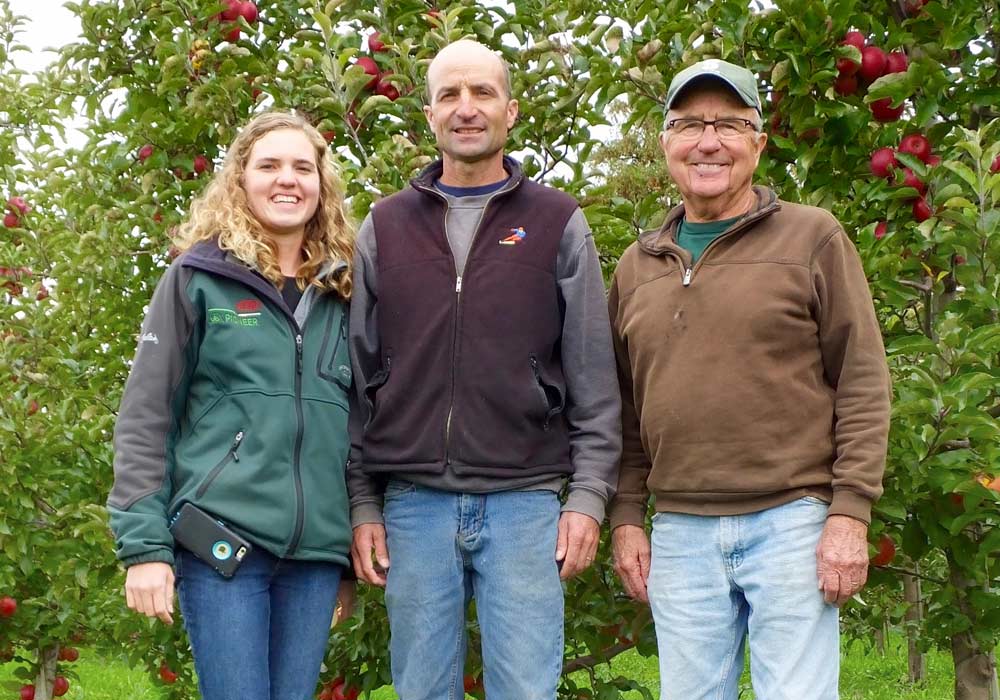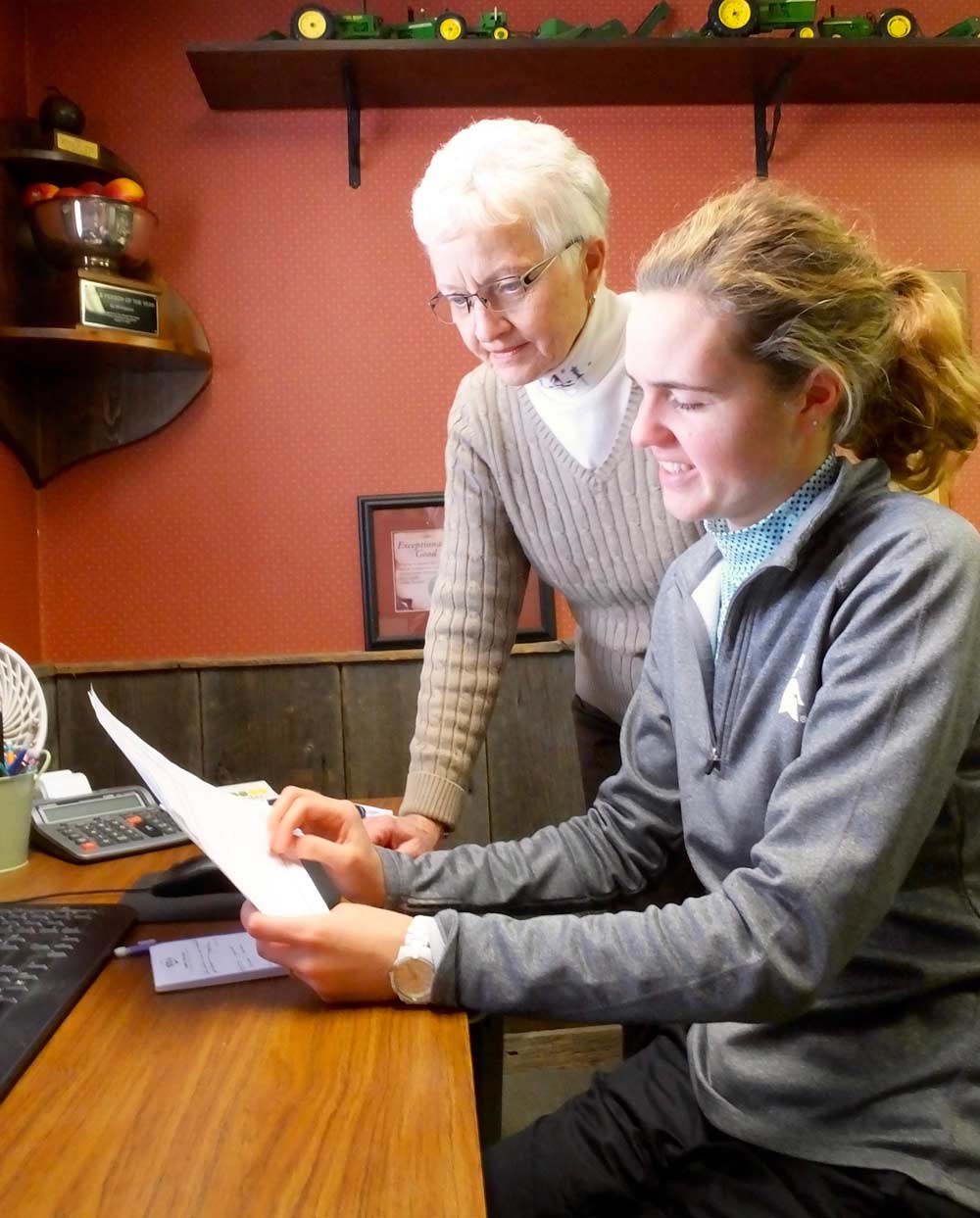
Three generations of Wittenbachs — Elizabeth, her father, Mike, and her grandfather, Ed — pause in the test plot, which includes seven new varieties from Washington. Elizabeth is particularly intrigued by newly released cultivars and looks forward to seeing how well the options fare in the orchard. (By Leslie Mertz)
At 22 years old, Elizabeth Wittenbach has a lot on her mind.
Fresh from college and weighing different agricultural career options, she opted to take a position on the home team and join family-owned Wittenbach Orchards, LLC, in west-central Lower Michigan.
Her decision to be a fifth-generation farmer and fourth-generation fruit grower on her family’s 125-year-old farm didn’t come easily. In fact, her father, Mike Wittenbach, insisted she go to college and pursue options away from home.
“It’s important, because agriculture is not the easiest business to be in,” he says. “I think it has to be something you truly desire, and I don’t think you know that until you leave the farm and see how the rest of the world operates, including other business entities.”
Rounding the bases
For Elizabeth Wittenbach, that meant heading off to Michigan State University. While she pursued a degree in agri-business management and a minor in horticulture, she continued to look at options outside the family business.
She spent part of her sophomore year as Michigan Apple Queen, where she got a good introduction to ag tourism; she interned in her junior year at Wilbur-Ellis, which is an international marketer and distributor of chemicals and other agricultural products; and she also spent a semester in Washington, D.C., taking classes and working four days a week with a lobbying firm for members of the National Council of Farmer Cooperatives.
Once she entered her senior year, Wittenbach began perusing the job market and going on interviews. “Nothing was fitting like I wanted, so I spent a lot of time in the fall talking with my dad, and the more we talked, the more we both felt the time was right for me to come back home and work full-time here.”
It made sense for her father who had an especially busy growing season coming up in 2016, for her grandmother who was anxious to give up her office role in the business, and especially for her personally, the young grower asserts. “By that time, I knew I wanted to be on the farm. That’s what I love.”
As soon as she finished her last class at Michigan State in early May, Wittenbach jumped right into the family business.
“I like math and accounting, so I have enjoyed learning from Grandma this summer and starting to take over payroll, accounts and the office side of things,” she says. “I actually like to come in on my own in the morning before we head outside, so I can have at least a half hour to make sure I’m up to date on everything in the office, and then after that, I go out with the crew. I really like the balance of the outdoors and the office.”
Ready to play

Linda Wittenbach gladly passed on the accounting duties to her granddaughter over the summer, but she continues to provide advice every now and then. (By Leslie Mertz)
In the field, she does a little of everything, including lots of pruning, spraying, driving, and cutting out fire blight.
Her face lights up when she describes one of her favorite jobs of this past summer: pruning trees for hours on end with her grandfather.
“I like knowing that I’m making cuts that are going to matter to the tree long term,” she describes. “Plus, I get to work with my darn grandpa every day! How many people get to say that? It’s so enjoyable, and I love the legacy and the tradition.”
Asked about the most challenging aspect of working at the orchard, she says it’s her Spanish language skills, especially when she is driving harvesting equipment and conversing with workers during fast-paced picking.
“One of the groups in my crew has two young guys who really don’t speak English, but I am having such a blast with them because they’re always challenging me with language and keep saying in Spanish ‘you can, you can,’” she says. “It was really intimidating at first, but now that the harvest is ending and they’ll be leaving, I’m going to miss the guys. They’re just so fun!”
She’s also a bit apprehensive when she thinks that she might one day take over the entire operation, but she is trying not to think about that quite yet.
“In general, the whole thing is kind of scary, but fortunately I’m not making a lot of the decisions at this point and I have really great teachers in my dad, grandpa and grandma, so that makes things easier for sure,” she remarks.
Extra coaching
Besides family, Wittenbach is tapping other resources to help her prepare for a farm career.
That includes the industry contacts she has made through her father and grandfather and while participating in organizational events, such as the International Fruit Tree Association (IFTA) New York State Study Tour in July, and a SweeTango growers’ meeting during a college spring break in 2014. “Things are starting to click,” she says.
She knows very few other people her age who are growers, other than a couple of “neighbor boys” and one other young grower she met over the summer. “People are spread out around here, so I haven’t met many yet,” Wittenbach says.
She also hasn’t found social media especially useful to connect with other growers her age or to find information.
“I know there are a lot of young people who obviously use it more than I do, but for me, it just hasn’t been a good tool,” she says. Nonetheless, she is testing the social-media waters as a platform for providing consumer education from the orchard. She just began using Instagram to post a few photos she hopes will bridge what she calls a “disconnect between what people think they are eating and how it’s produced.”
For current updates about varieties, growing systems and technologies, Wittenbach subscribes to various electronic newsletters and blog posts and receives print publications. “I try to scroll through the online stuff in the evening and read those articles that pertain to what we’re doing,” she says.
The resources she finds most useful are those that introduce and describe new varieties as well as new technologies to improve fruit quality and overall orchard efficiency.
She noted that the orchard just signed up for 10,000 trees to produce Smitten, an apple from New Zealand that blends Gala, Braeburn, Falstaff and Fiesta, and also has test plots of several additional releases from Washington.
“It’s exciting. I like the chance to try new things,” she says. “I feel like we’re getting so much better at growing quality fruit and good-tasting fruit.”
On the technology side, she is intrigued by new tree architectures.
“The way we’re planting is so different from how it was when I was little. Even in the last five years, you can see differences in how my dad is planting trees and using a trellis system. It’s continuous improvement,” she says.
She pointed to 2D systems that were discussed at the IFTA meeting. “That’s even smaller than what we’re doing. There is just so much learning opportunity and I like that.”
Easing into a new season
When asked about the future, she smiles and shrugs. She is the oldest of three children, including a brother who is in his third year of college and is taking ag business classes and a younger sister who is in high school.
“My brother and I are pretty sure that the long term will be he and I together running the business, but my dad’s young, so there’s no rush on that,” she says. “We’re just kind of taking it slow around here.”
Although her father pushed his daughter out to see the world, he is glad to have her back.
“It’s always good to have young blood come into the business, especially when it’s family. They bring ideas and change, and that’s good,” he says. Of course, that doesn’t mean all new ideas are good ones. He grins and adds, “The fourth generation has to listen to the fifth generation, but we haven’t been here four generations because we don’t know what we’re doing.”
Ed Wittenbach is also delighted with his granddaughter’s decision to join the family business.
“I think it’s great to have the fifth generation on this farm. It’s great to see it passed down, because I think the family farm is the backbone of America and will continue to be. I really believe that.” •
– by Leslie Mertz, Ph.D., a freelance writer based in Gaylord, Michigan.






Leave A Comment